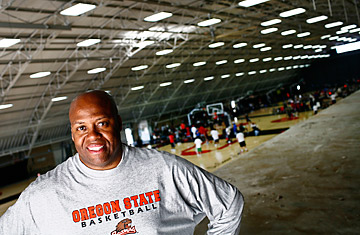
Craig Robinson, head basketball coach at Oregon State University
Craig Robinson was thrust into the national spotlight two summers ago after he introduced his sister, Michelle Obama, before her speech at the Democratic National Convention. Though he receives plenty of attention for his family ties, the first brother-in-law has built an impressive career in his own right. Ten years ago the former investment banker left a high-paying finance gig to chase his dream of coaching basketball. Now, Robinson is head man at Oregon State University, where he has led an impressive turnaround of what was once a sad-sack program. Robinson talked to TIME about his family, his career, and his new memoir, A Game of Character.
A significant portion of the book is dedicated to describing the lessons you learned from your father, Fraser, who passed away in 1991. What was it like, emotionally, to write about him?
I wanted to pay tribute to the lessons he taught us. A good example was my dad's relentlessness. He was a guy who worked a shift job, sometimes double shifts, and he still had the energy to come home and play with his kids, whether it was on the floor, with the dolls with my sister, or throwing the ball around.
How do you think your parents' example has helped your sister, and perhaps impacted her relationship with the President?
I don't like to speak for her. She has her own way of managing things, but it's really nice is to see her as a mother. It's like watching my mom raise her kids. I think both she and Barack are very grounded. I love the give and take and [their] partnership. Everyone's relationship should be like that. It has to be a partnership. One person can't be the friend, [with] the other person being friended all the time.
What was the relationship like between your father and President Obama?
It was brief. My dad was the kind of guy who could get along with many different constituencies, many different intellects. He was never worried about station in life when it came to having a relationship with [someone]. He got along with Barack just as well as he did with everyone else in the family.
How did your dad influence your decision to become a basketball player at Princeton?
I was fortunate to have a couple of offers. One was from the University of Washington, one was from Princeton. But Princeton doesn't have athletic scholarships. So I picked the University of Washington because I thought it would save my folks like $4,000. So my dad did what dads do when you make the wrong decision. He sort of did one of these chin rubs, looked down and said, "Why don't you think about that?" And I went to bed and thought about it and realized that I did want to go to Princeton, I just didn't want him to have to pay. And as soon as I said that he said, "Ok, you're going to Princeton." That showed sacrifice.
You and I both played basketball in college for Pete Carril, the Hall of Fame basketball coach who won over 500 games at Princeton. Characterize his impact on your life, and give me your favorite Carril story.
When I came to Princeton, I was your typical city kid who already thought he was a basketball player. Thank goodness coach Carril wasn't one of those coaches who would just shun you if you didn't agree with what he thought. He was tough and he made sure I knew that I didn't know anything about the game. He rebuilt me into a player. I always tell people I really learned to play from him.
My best Carril story was I came back from Europe, where my team in England had allowed me to do some coaching. It was the first time I thought I wanted to be a coach. I was thinking, 'I'm good at it and I love teaching, talking about the game of basketball.' So on my way home to Chicago I stopped off at Princeton to say hello to coach Carril. I said, 'coach, I know what I want to do, I want to be a coach.' And he said 'you don't want to be a [blank] coach' — and you can fill in the words — and I was stunned. But later on, when I sat back and thought about what he was saying, he wasn't being malicious. He just saw this kid from the south side of Chicago work his way through Princeton, and get this opportunity to play in Europe, then he's coming back and he's going to be all basketball. He wanted me to have some other experiences.
Coach Carril wasn't afraid to be critical of his players. What was the one thing he harped in on with you?
He thought I wouldn't run as fast as I could all the time. So he called me "Grandfather Time." Not "Father Time," but "Grandfather." Only he could take Father Time to the next level.
Your sister enrolled at Princeton two years after you did. What was that like?
It was a lot of fun having a familial support system there, although she probably had fewer boyfriends because I was around. Not because I chased them off, but you know how it is. If your big brother is around and you're in college, it's different. She was probably glad when I left.
On a scale of one-to-10, where do you fall in the "boyfriend interference" department?
I was like a three; I didn't have to interfere. She could take care of herself.
